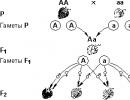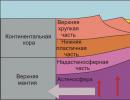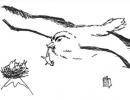Czech intruder main characters. A.P. Chekhov "The Intruder": description, characters, analysis of the story Several interesting essays
During the lesson, students will consider the features of A.P.’s humor. Chekhov, get acquainted with the content of the story “The Intruder”, determine its main idea and problems.
Topic: From 19th century literature
Lesson: Story by A.P. Chekhov's "Intruder"
In 1880, the first publications of Anton Pavlovich’s humorous stories appeared in the magazine “Dragonfly” (Fig. 1). He publishes his humoresques under a variety of funny pseudonyms: Baldastov, My Brother's Brother, The Man Without a Spleen, Antosha Chekhonte.
Chekhov is also published in various publications, where his stories are accepted, but still gives preference to the magazine “Oskolki”, where a special department was created for him called “Fragments of Moscow Life”.
Rice. 1. Magazine "Dragonfly" ()
Anton Pavlovich Chekhov is known as a master of the short story. His ability to find the exact artistic detail, his talent for reflecting the subtlest emotional experiences of the characters earned him fame in many countries around the world. “...Humor is the wit of deep feeling...” - This wonderful definition fits Chekhov's stories perfectly. Here humor not only makes you laugh, but also “scratches” your heart to tears.
It is important to understand and feel that humor is not a separate part of Chekhov’s work, it is his view of the world, his vision of life, inseparable from irony and a tragic smile. The writer could not ignore the unrest and wrongness of life, but everything written in his works received a tragicomic sound, such are the features of Chekhov’s talent.
So, mixture of comic and tragic. It is this feature of Chekhov’s humor that we will consider using the example of the story “The Intruder.”
Analysis of the story “Intruder”
The story was first published in 1885 in the Petersburg Newspaper, and then included in the collection “Motley Stories”. Already during the writer’s lifetime, the story “The Intruder” was recognized as a masterpiece. So, for example, L.N. Tolstoy admitted: “I’ve read it a hundred times.”
The story clearly demonstrated all the features of Chekhov’s humor: laconicism and precision in creating images, the ability to outline a problem, sometimes on an all-Russian scale, in a few strokes.
Meaning of the name
The word "malicious" is formed by merging the stems of the words evil And intent. About what malice is it in the story?

Rice. 2. Illustration for the story “Intruder” ()
A simple peasant from Klimovsk peasants, Denis Grigoriev, stands in front of a forensic investigator (Fig. 2). He was caught doing a very unsightly thing: he was trying to unscrew a nut from the rails, so that he could later use it to make a sinker. The story is based on a dialogue between the investigator and the attacker. Their conversation evokes both laughter and pity. After all, the peasant cannot understand that such actions are criminal, since unscrewing the nut from the rails can lead to a train crash, and therefore the death of innocent people.
Heroes of the story “Intruder”
In the story two heroes, representatives of 2 social strata, so far from each other that there is no mutual understanding between them. This is an investigator on the one hand and a little man on the other.
Chekhov does not specify the name or appearance of the investigator. This makes the hero faceless and at the same time gives the image collecting. We imagine a typical official, a man in uniform, sitting at a table, taking notes on an interrogation. Before us is a dry lawyer, confident that every peasant knows the entire criminal code. This belief is expressed in the words of the investigator:
“Listen... Article 1081 of the Penal Code says that for any damage to the railway caused with intent, when it could endanger the transport following along this road and the culprit knew that the consequence of this should be a misfortune... do you understand? knew! And you couldn’t help but know what this unscrewing leads to... he is sentenced to exile to hard labor.”
There is only one thing that is comical about the investigator: his sincere bewilderment at the man’s ignorance.
It is the little man who is the main character in the story. We learn his name - Denis Grigoriev - and read a fairly detailed description of his appearance: “A small, extremely skinny man in a motley shirt and patched ports. His hairy and rowan-eaten face and eyes, barely visible because of thick, overhanging eyebrows, have an expression of gloomy severity. On his head there is a whole cap of unkempt, tangled hair that has long been unkempt, which gives him even greater, spider-like severity. He's barefoot." In his description, Chekhov emphasizes not just the man’s poverty, but his savagery and neglect. He looks like a primitive man. After such a description, we expect aggression and anger from the hero, because Chekhov uses the epithet “severe” twice. However, in a conversation with the investigator, the little man shows opposite qualities: harmlessness, good nature, naivety. He admits to unscrewing the nuts from the rails, and is sincerely perplexed as to what his crime is:
"- Well! For how many years the whole village has been unscrewing the nuts and God preserved them, and then there was a crash... people were killed... If I had taken away the rail or, let’s say, put a log across the track, well, then, perhaps, the train would have deflected, otherwise. ..ugh! screw!"
What is Chekhov making fun of in his story? Darkness, ignorance, lack of education of a man. His illiterate speech says more about the hero than the author could say in a description of his life. In order to understand Denis Grigoriev, you need to do vocabulary work that will help translate the man’s illiterate speech into literary Russian.
Vocabulary work:
faq - what;
obviously - of course, naturally;
something - perhaps;
tokmo - only;
her - her;
then - then;
let's go - let's go;
go - go;
it seems - it seems.
The main character's speech amazes with its illiteracy and illogicality. His head is a mess: he talks at the same time about fishing, and about his village, and about the railway guard who caught him in the act of crime. At first we get the impression that the man is simply being cunning, trying to evade responsibility, and we share the opinion of the investigator: “What a fool he is pretending to be! It’s like he was born yesterday or fell from the sky.” However, the author soon makes it clear to us that the man really does not realize all the consequences of his crime. He is completely sincerely indignant:
“- To prison... If there was a reason, I would have gone, otherwise... you live so well... For what? And he didn’t steal, it seems, and he didn’t fight...”
The story ends with the man being taken to a cell, and he accuses the investigator of injustice:
“- Judges... We must judge skillfully, not in vain... Even if you flog, but for the cause, according to your conscience...”
This last line makes me think. Is the man really to blame? Yes, according to the law, he committed a crime. But why did he do this? Why is the whole village unscrewing the screws? For fun or with malicious intent? From the man’s incoherent remarks we can still piece together a sad picture of his life: oppression by the headman, arrears, arbitrariness of the authorities. To feed themselves, the whole village fishes. This is how people live. And for fishing you have to unscrew the nuts and use them as a sinker. Why nuts? Is there really nothing else? And the hero gives an exhaustive answer to this question:
“You won’t find lead on the road, you have to buy it, but a carnation is no good. You couldn’t find a better nut... It’s heavy, and there’s a hole.”
The people have their own logic, the logic of survival in those social conditions in which a person turns into a wild, absurd, downtrodden creature.
“You're disturbing me... Hey, Semyon! - the investigator shouts. - Take him away! - this is the solution to the problem that Chekhov shows us. Is this fair? Of course not.
Thus, in his story, Chekhov humorously describes a situation that really seems funny at first glance. But the main thing the writer sought was to make the reader doubt the fairness of the verdict, arouse sympathy for the peasant and condemn a system that is indifferent to the people’s grief and avoids solving social problems.
In the critical review “About Everything”, published in the magazine “Russian Wealth” in 1886, it was written about “The Intruder”: “Small strokes, sometimes in one word, paint both life and the situation so clearly that you are only surprised at this skill - to bring into one tiny focus all the necessary details, only the most necessary, and at the same time excite your feelings and awaken your thought: in fact, take a deeper look at this investigator and this man, because these are two worlds, separated from one and the same life; both are Russian, both are not essentially evil people, and both do not understand each other. Just think about it, and you will understand the depth of content in this tiny story, presented on two and a half pages.”
Bibliography
- Korovina V.Ya. Didactic materials on literature. 7th grade. — 2008.
- Tishchenko O.A. Homework on literature for grade 7 (for the textbook by V.Ya. Korovina). — 2012.
- Kuteinikova N.E. Literature lessons in 7th grade. — 2009.
- Korovina V.Ya. Textbook on literature. 7th grade. Part 1. - 2012.
- Korovina V.Ya. Textbook on literature. 7th grade. Part 2. - 2009.
- Ladygin M.B., Zaitseva O.N. Textbook-reader on literature. 7th grade. — 2012.
- Kurdyumova T.F. Textbook-reader on literature. 7th grade. Part 1. - 2011.
- Phonochrestomathy on literature for the 7th grade for Korovina’s textbook.
- FEB: Dictionary of literary terms ().
- Dictionaries. Literary terms and concepts ().
- Explanatory dictionary of the Russian language ().
- A.P. Chekhov. Attacker().
- A.P. Chekhov. Biography and creativity ().
- Biography and creativity of A.P. Chekhov ().
Homework
- Try to adapt Denis Grigoriev's speech using words from the notes. What changes in the story?
- What does the story make you think about?
- What is the peculiarity of A.P.’s humor? Chekhov? Support your answer with examples from the story “The Intruder.”
- What Chekhov stories have you read? What can you say about their author?
Initially, the publisher of Chekhov's story "The Intruder" was "Petersburgskaya Gazeta" - it was there that this work appeared in the summer of 1885. This story continues a line of miniatures known for making the reader “laugh through tears.” Now we will make a brief analysis of the story “The Intruder” by Chekhov, which is small in volume, but very informative in idea and problems.
Plot of the story
Before briefly considering the plot of the story, we note that thanks to this work we better understand what kind of relations developed at that time between the peasants and the ruling class, and their problems.
So, the main character of the story “The Attacker,” which we are analyzing, is answering in court. His name is Denis Grigoriev, he is dressed very simply, like a peasant, and stands barefoot. And despite the fact that his mind is not sharp, Grigoriev is ready to assert and prove his innocence. What is he accused of?
This simple man was just trying to unscrew the nuts from the railway rails in order to make weights for the seine. It turns out that the seine itself does not sink, and accordingly, it is very difficult for them to catch fish. What does the court say to this? Of course, it is difficult for the judge to accept such arguments, and he explains to Grigoriev that due to loosened nuts, a train crash could occur and then people would die. But Denis Grigoriev assures the judge that he could not have such intent, it’s all in the net.
And it soon becomes clear that Grigoriev is not alone. Almost the entire village of men does the same thing, and what’s more, the gentlemen buy ready-made seines from them. What can a judge do? He orders the man to be sent back to the cell, and Grigoriev’s surprise knows no bounds, they say, how can this be, why?
Analysis of the story "Intruder" - the idea of the work
Chekhov in his work shows well the negligence of the Russian people, which has been and remains an eternal problem. But whose fault is it that village men have to unscrew the nuts from the rails, and the result of such actions is a train wreck? Of course, when we read the story and analyze it, it is clearly visible that the main character has no malicious intent to destroy people. For example, it was not without reason that Chekhov presented Grigoriev barefoot - he is a poor man, and he feeds only thanks to this net.
Therefore, by looking at the problem not with a superficial glance, but deeply, we understand who is really to blame for this situation. That is, the attacker is not a village man. This is what becomes clear thanks to the analysis of the story “The Intruder”: ordinary men make seines with nuts, and they are encouraged to do this by gentlemen who willingly buy these products. Is it really not clear to gentlemen where the nuts on fishing tackle come from? They all understand perfectly well, but prefer to remain silent.
The peculiarity of the work we are considering is its realistic orientation, because Chekhov described what was actually happening in Russia at the end of the 19th century. Let us not omit another important detail of the analysis of the story “The Intruder”. Its composition is such that the author seems to snatch a moment from the events taking place - this is the trial of Grigoriev. But we know neither the beginning of this story nor its ending. And Chekhov does not report the verdict, from which it follows that the author leaves this to the discretion of the reader.
So, to summarize, we can say that the work raises one of the most pressing problems of Russian society - negligence and its real culprits.
In this short article we have made a brief analysis of the story “The Malefactor” by Chekhov, and we hope that it has helped you better understand the work and its main idea. Check back often for our literary blog, where you'll find hundreds of articles with reviews, analysis, and character profiles.
Characteristics of the main characters in the story The Intruder, and received the best answer
Answer from Marat Baimukhametov[guru]
Since childhood, we have all been taught to tell the truth and not to deceive, not to break the law and to be responsible for our actions. If you live honestly, then you will not be ashamed of what you did before. And we were also TAUGHT to think first, and then act, and generally try to act in such a way as not to harm anyone. You think about all this when you read the story of the Russian writer Anton Pavlovich Chekhov “The Intruder”.
Although the main character of this story - a poor skinny man, dirty and unkempt, barefoot Denis Grigoriev - does not deceive anyone. He truthfully answers the investigator's questions in court.
It turns out that his fault is that he unscrewed the nut on the railroad that attaches the rails to the sleepers. He did this in order to make a sinker from a nut for fishing. Otherwise, you won’t catch fish in their area, even the “lowest boy” knows this. Denis Grigoriev did this for several reasons, one of them was poverty: “You won’t find lead on the road, you need to buy it, but a carnation is not good.”
Denis Grigoriev was not going to cause a train wreck: “...I didn’t have such thoughts in my head... We’ve been unscrewing so much... we’re leaving... We’re not doing it crazy... we understand...” It turns out that all the Klimov men unscrew the nuts, and Mitrofan Petrov makes seines “and sells them to the gentlemen. He needs a lot of these same nuts. For every seine, there are about ten of them...” This is the second reason why the nuts on the railway are unscrewed: for the master’s nets, because gentlemen also catch fish.
That is, the gentlemen know where the nuts for their seines come from and turn a blind eye to the fact that “damage to the railway... could endanger... transport... and the consequence of this should be misfortune.” Both men and gentlemen know this. The men are guilty because of the master's whim. The judge understands that it is impossible to take into custody and send to prison all the gentlemen in the area (after all, it is for them that the men unscrew the screws), and therefore cannot pass a sentence; he writes something without listening to Denis. Denis justifies himself and says that he is not deceiving and is ready to confirm this under oath.
The investigator never made any decision - there is no mention of this in the story. And Denis, resisting two burly soldiers, mutters: “We must judge skillfully, not in vain... Even if you flog, but for the cause, according to your conscience...” He still doesn't understand what he is accused of.
The attackers in this story are not Denis Grigoriev and his brothers or any of the Klimov men, but those gentlemen because of whom the men break the law. If they really did not act according to their conscience, they would be ready to answer for it, but not in vain! That is, the title of Chekhov's story “The Intruder” is ironic. The real criminals are not ordinary peasants, but their masters.
A special place in the work of Chekhov the humorist is occupied by a miniature joke story and an everyday scene, entirely built on dialogue. They are still popular today because behind the comical dialogues, the life and customs of an entire era are revealed. A number of humoresques are based on the principle of mutual misunderstanding of the participants in the conversation, each of whom repeats his own. This is exactly the case in the story “The Intruder.”
On August 7, 1885, “The Intruder” was published in the “Petersburgskaya Gazeta” under the pseudonym “Antosha Chekhonte”, which was subsequently included in the writer’s first collection “Motley Stories”.
Vladimir Gilyarovsky believed that the prototype of the main character is the peasant Nikita Pantyukhin from the village of Kraskovo, Moscow province. Although the writer had a negative attitude towards the question of the prototypes of his heroes, since for the most part his characters are generalized images.
Genre, direction
The life of ordinary people in Russia, their feelings and aspirations have always interested Anton Pavlovich. He is a successor to the best traditions of the realistic movement in literature. The style of his prose is satirical, where there are “funny” situations and scenes, absurd forms of behavior and speech.
The work was published with the subtitle “Scene”. The genre is a humorous story in which the author delicately, with irony and compassion laughs at his characters.
Humor is associated with a vivid vocabulary surprise, illiterate, illogical speech of the character, as well as an absurd situation when the investigator believes that there is an attacker in front of him demanding punishment, and the “person under investigation” does not understand the tragedy of his own situation.
“Funny” and “sad” are closely intertwined in the story.
Plot
The focus is on the dialogue between the forensic investigator and the stupid “little man”, this is the essence of the story.
A skinny man unscrews a nut on a railroad track in the morning. The lineman Ivan Akinfov catches him doing this “work” and takes him to the forensic investigator. An interrogation begins in order to clarify the circumstances of the theft and prove Grigoriev’s guilt.
The man admits that what happened (the theft of the nut) is a common thing for the Klimovsk men, since their main business is fishing. And nuts are used to make sinkers.
To the accusation that unscrewing the nuts could lead to a train crash, Denis, grinning, objects: “If only the rail had been carried away... otherwise... the nut!”
The result of the investigative dialogue is that the “attacker” is taken into custody and sent to prison.
The main characters and their characteristics
- Denis Grigoriev. Characteristics and description of the attacker: a skinny little man with overgrown hair. Thick eyebrows hang over the eyes, giving the impression of constant gloominess. The head of unkempt hair somewhat resembles a spider's web. Denis’s appearance most likely speaks of his untidiness rather than poverty. Grigoriev’s portrait is evidence of the character’s “confused” life, which he himself cannot understand. He is well versed in the fishery business. Knows the peculiarities of fishing for different types of fish. He is a practical person, as he sensibly explains why lead, a bullet or nails should not be used as a sinker. He indignantly rejects the accusation that unscrewing the nuts could lead to the death of people (“we are some kind of villains”). Honesty is an important trait of his character. When the investigator directly tells him that Denis is lying, he is sincerely surprised by this, since “I never lied.” He talks in detail about the existence of nuts among him and other men. In particular, Mitrofan Petrov needs a lot of nuts, from which he makes seines, and then sells them to the gentlemen.
- Investigator- representative of the law. The author does not endow him with any portrait characteristics or character traits characteristic of him. The absence of a name suggests that this is a collective image of the social layer of bureaucracy.
- The problem of the people is decided by the writer in his own way. He lives in transitional Russia, among humiliated people and deprived of fate. He does not stay away from the “peasant” theme. Truthfully shows the contradictions of village life. Having no other income, village men fish to feed themselves. And for this you need nuts that can only be unscrewed from the railway tracks. And the person finds himself at a crossroads: a state of servitude forces him to commit a “crime” (although he himself does not think so), which is then inevitably followed by “punishment”.
- In this regard, there arises problem of justice, responsibility before the law. An evildoer is a person who deliberately intended evil and is therefore obliged to appear before the law. But men who find themselves in difficult social conditions are not like that. They are Christians. “Evil” and “crime” are alien concepts to them.
- The problem of power, violence a red thread runs through the entire narrative. For what everyone else does, one will receive hard labor, and only because a lazy official accidentally noticed him. Alas, there is no supervision of the tracks, so people don’t even know what can be done and what cannot be done. To them, illiterate and uneducated, no one explained the meaning of the laws.
- The problem of mutual misunderstanding. Thus, the investigator, recalling the train crash last year, speaks of his “understanding” of what happened, linking the tragedy with the theft of nuts. Denis perceives this situation in his own way, interpreting the investigator’s “understanding” as a feature characteristic only of educated people. In his opinion, the “peasant mind” perceives what is happening differently and is not capable of drawing conclusions. Grigoriev is told that he could be sentenced “to exile at hard labor,” to which Denis replies: “You know better... We are dark people...”. When they announce that the consequence of his “actions” is now being sent to prison, he objects with surprise that there is no time now, since he needs to go to the fair.
- Theme of negligence, dishonest attitude towards state property is not affected by chance. Rich gentlemen buy seines to satisfy their personal needs, and do not think at all about where men get their nuts from. The gentlemen who buy gear are absolutely not concerned about the condition of the railway, about train crashes, or about the fact that they themselves may find themselves in one of them. This is some kind of typically Russian irresponsibility that has been accumulating in the Russian people for centuries.
Topics and issues
The problems of the story are rich and complex, which makes it all the more surprising that the author put it into such a laconic form.
the main idea
Sparing details recreate a picture of village everyday life, behind which the features of Russian reality are revealed. And in this mosaic, consisting of many “episodes,” hidden evil triumphs, and the point of the story is to show and prove it. All content is imbued with deep drama. The reader is presented with a painfully unhappy man, driven by circumstances. He is a savage, but pity for him, for ordinary men, for the fact that a person essentially innocent of the evil that is happening may suffer, “overwhelms” the reader.
The accusatory scene presents a line of protest against the lies that reign in Russia, where unenlightened people eke out a miserable existence, and the government, which does not see the person, hides behind laws that contradict the humane attitude towards people. This is the main idea of the work. The story evokes feelings of bitterness and regret.
What does it teach?
Chekhov cultivates independence, will and intelligence in his reader. What worries him most is the inner weakness of the human spirit. He says: “It is better to die from fools than to receive praise from them.” The main criterion of actions should be conscience. Everything must be done according to conscience: “Even if you flog, but for the sake of it.” Here is the moral of the piece.
The writer wanted cheerfulness to become everyone’s lifestyle, because it is precisely this that is a condition and a sure sign of the spiritual health of the nation.
The true criminals are those “masters of life” who do not care about public order, but satisfy only their whims and desires.
What is the author making fun of?
Chekhov was convinced that slavish behavior before the “powers that be” could only be countered by laughter. The writer makes fun of the darkness and ignorance of the people, who are not free even in their own feelings.
The comedy is created by the equanimity and peculiar prudence of the responses of the “attacker”, who is unable to understand what they want from him and why he is here. The position of the investigator, driven to frenzy by the impenetrable stupidity of the man, is comical.
Chekhov's humor always “keeps pace” with sadness, which is born from the fact that a person cannot stand up for himself or maintain his self-esteem.
Laughter is a reason to pay attention, first of all, to your shortcomings and “squeeze the slave out of yourself drop by drop.”
Interesting? Save it on your wall!Title of the work: Intruder
Year of writing: 1885
Genre of the work: humorous story
Main characters: Denis Grigoriev- man, Investigator- judicial worker.
Plot
The story is written in the form of a dialogue between a court investigator and a simple man Denis Grigoriev. Ivan Semyonov Akinfov, a railway watchman, caught a peasant unscrewing the nut that holds the rail. As it turned out, he needed it as a sinker for fishing. It’s also convenient, it already has a hole and you don’t need to buy it, like lead or similar material. Accusations that people could have suffered due to negligence do not apply to Grigoriev. Quite the contrary. Denis makes excuses and does not consider himself an attacker. Thinking only about fishing, a man is not mentally capable of comprehending the danger to human lives. It turns out that the nuts are used en masse to make seines for the gentlemen. Denis is taken into custody, but he still does not understand the reason for the arrest.
Conclusion (my opinion)
Chekhov clearly showed the real traits of the Russian people. The most important person you should worry about is yourself. There is criticism of the system, under which people simply become dumb and are unable to make sound decisions. And the gentlemen who buy seines are also criminals. They know everything, but they turn a blind eye to the threat. The story makes you understand that people like us live nearby. If every person thinks about their neighbor, the world will become a better place.






